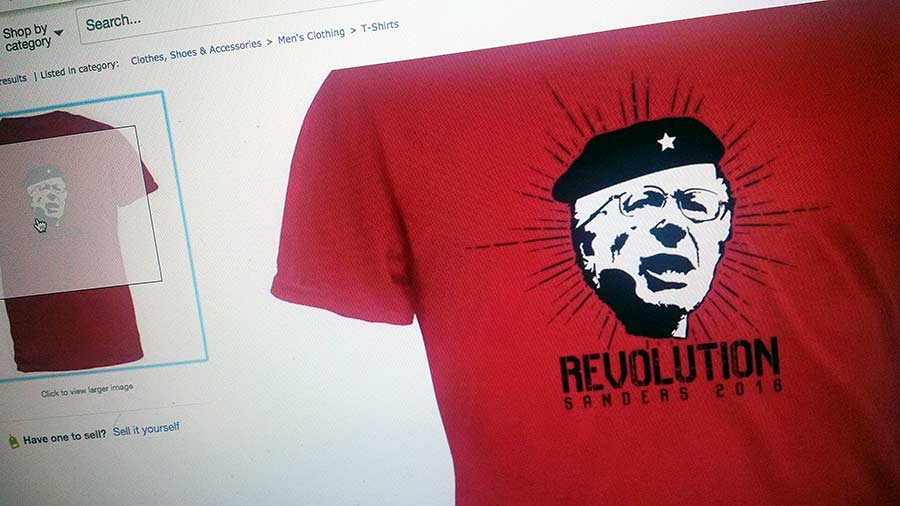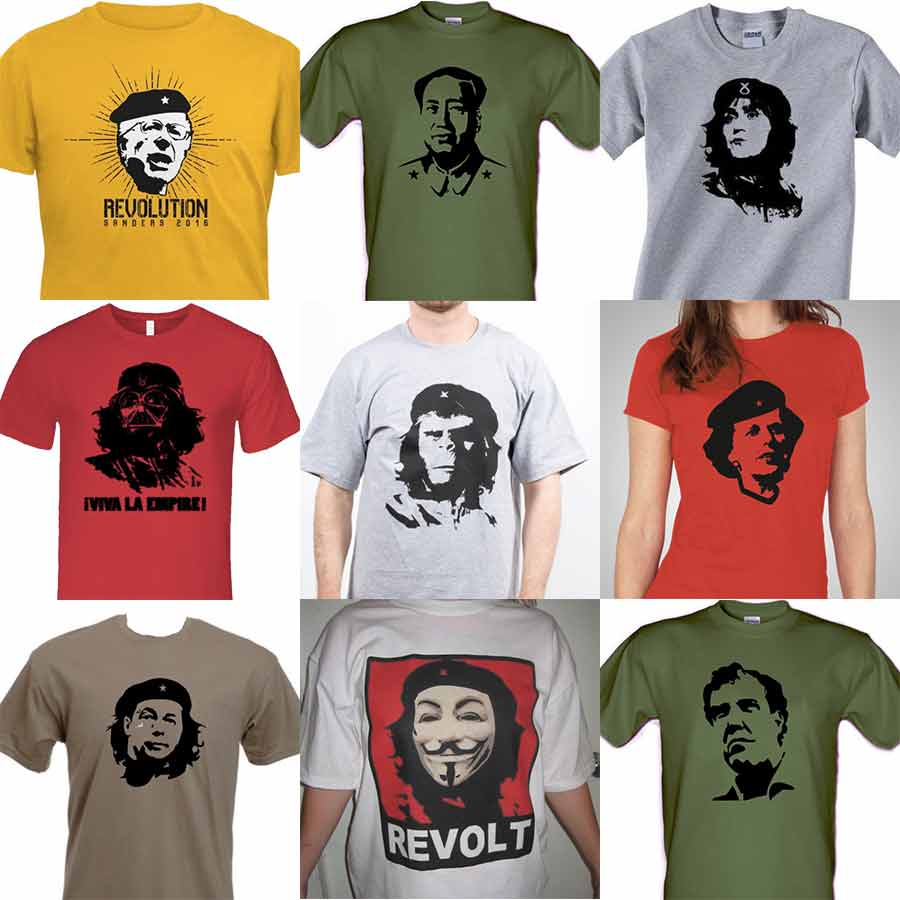Is your chosen hero the correct type of rebel?

A variety of t-shirts and other items are available online with public figures; such as Bernie Sanders; portrayed as Che Guevara. This photo, of an online sales site, is Creative Commons, but the product itself may have copyright elements.
What do US presidential candidate Bernie Sanders, late British prime minister Margaret Thatcher, the past two leaders of Scotland and Star Wars stormtroopers have in common? They’re all revolutionaries like Che Guevara. According to what could be described as the original meme.
The desire to be seen as a revolutionary, or to portray your chosen political leader as the correct type of rebel, has driven an increasing use of a single image for a very diverse set of leaders from a spectrum ranging from Communist to neoliberal arch-conservative.
The image of Ernesto “Che” Guevara, the Argentine Marxist revolutionary and major figure in the rise of Communist Cuba, has now become so widespread – particularly on T-shirts – that experts question what it actually means, if anything, to voters.
An original 1960 photograph by Cuban fashion photographer Alberto (‘Korda’) Díaz Gutiérrez was “posterised” by Irish photographer Jim Fitzpatrick and since been used widely and without any copyright issues. Mr Fitzpatrick in recent years has said he was keen to restore some measure of control over the image so the the Guevara family could see some income from it.1
Bournemouth University senior lecturer in creative advertising Rutherford2 said the image continues to be divorced from the revolutions it originally symbolised. And as time goes on, and the further you get from Latin America, the less it has anything to do with revolutions.
“Increasingly, the image seems to be used less and less as a means of identifying oneself with a radical left political ideology,” he told Tomorrow by email.
“There is reason to believe that an increasing proportion of those who sport the image have little or no idea who ‘the revolutionary guy’ is or what he stood for. But, like so much in an increasingly consumerist society, [where] a desirable or attractive persona can be acquired simply by buying the ‘right stuff’, the image is seen as – and so has become – a way of implying that one is not a conformist.
“Originally associated with anti-capitalist and ‘anti-establishment’ policies, as we get farther in time and space from 1960s America, it seems that the image is less often used as a means to express solidarity or allegiance with the policies and practices of the anti-capitalist, anti-imperialist Latin American revolutionary groups with whom ‘Che’ was associated.”
T-shirts easily available online with a Che-like image include left-wing UK Labour leader Jeremy Corbyn, nationalist Scottish First Minister Nicola Sturgeon and her predecessor Alex Salmond, British TV personality and right-wing columnist Jeremy Clarkson, musician Frank Zappa, the Planet of the Apes, right-wing UK Independence Party leader Nigel Farage, late UK Conservative prime minister Margaret Thatcher, a meerkat, Pikachu, pop “princess” Britney Spears, the animated Homer Simpson, Democratic US presidential candidate Bernie Sanders, Super Mario, band U2’s Bono, musicians the Sex Pistols, hacker group Anonymous, musicians Bob Marley and Morrisey, fascist leaders on the right and left such as Adolf Hitler, Mao Zedong, the Khmer Rouge, scientist Professor Stephen Hawking, fictional TV character Alan Partridge, Star Wars and the original Che set against various national flags.

Collage of some of many T-shirts for sale online using style of Che Guevara image. Creative Commons Attribution-ShareAlike 4.0 International Licence
Neil McGuire, a Glasgow-based graphic designer,3 said the original red of the manipulated image symbolised the political message of the man. But now it can make a point about the opposite politics.
“It’s kind of a viral image before we understood viral in the same way as we do now with the internet,” he told Tomorrow by phone. “It was a pre-meme meme. People can knock it about and do whatever they want with it, without it really damaging anything or changing the original image.
[Tweet “”It was a pre-meme meme. People can knock it about and do whatever they want with it””]“Some people use it with a full understanding of the original intended message. But if you don’t understand that, you can still use it on just a very basic level – like this person is anti-establishment or a rebel or stands for revolution in a very general sense.
“I think that’s part of the reason it’s so popular. You can access it on a whole load of different levels.”
Mr McGuire said some images, such as the Obama “Hope” poster of the 2008 presidential campaign or the CND logo, can be widely used and recognised, but Che is unique.
“There probably are equivalents in the digital world in terms of how things get appropriated but it wouldn’t be that kind of image,” he said. “I think that kind of image is probably synonymous with a particular time because it references how it was made and that’s changed a lot.
“I think images like the Che Guevera one have more latitude in them to be used in different ways. I’m not sure that flags quite have that. I think it’s very difficult for flags if used in designs to not, on some level, sort of relate to nationalism. There’s taboos around how you display flags and it can have different meanings in different contexts – it’s more difficult. People do use flags but they’re not going to have the same latitude within them to be adapted.”
If almost anyone’s face can become “revolutionary” Che Guevara, what should the public make of their political messages? Are the politicians actually rebels?
“You’re always encouraging people to dissect what they’re seeing,” said Mr McGuire. “People are very media literate and they understand what Photoshop is and that images can be put together in all sorts of interesting ways. Don’t take anything at face value and assume someone somewhere has manipulated the image you’re looking at. Ask questions about why that might be or what that might be saying.
“Particularly when things are on T-shirts people do understand it’s not official messaging as such.
“I think people understand that they’re made up in terms of what they’re saying – kind of like a moment in time.”
- Mr Fitzpatrick said he re-copyrighted the image according to his website and a posted comment. An attempt was made to contact him but Tomorrow received no reply. ↩
- University profile page for Rutherford, his only name. ↩
- LinkedIn profile page for Mr McGuire. ↩

